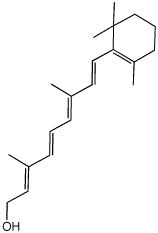Vitamins are substances that play an essential role in human metabolic processes, but which human cannot synthesize (except vitamin D). Small amounts of vitamins are essential for the regulation of all bodily processes. Vitamins must be obtained from the food on a daily basis. A person's diet must provide all the necessary vitamins. In their absence people develops certain deficiency diseases or other abnormal conditions.

|
| Figure. Vitamin A Struture |
Vitamin A is a generic term for a large number of related compounds. Vitamin A is commonly known as the anti-infective vitamin as it is required for normal functioning of the immune system. Vitamin A is required for healthy skin and mucus membranes, and for night vision. Retinoic acid (RA) and its isomers act as hormones to affect gene expression and thereby influence numerous physiological processes. Absence of Vitamin A from diet leads to a loss in weight and failure of growth in the childhood, to the eye diseases, xerophthalmia, and night blindness, and to a general susceptibility to infections. It is thought that it can also help prevent the development of cancer. Both vitamin A excess and deficiency are known to cause birth defects.
Vitamin A is structurally related to carotene. Carotene is converted into vitamin A in the liver, two molecules of vitamin A are formed from a molecule of beta carotene, hence good sources of carotene, such as green vegetables are good potential sources of vitamin A. Vitamin A is manufactured by extraction from fish-liver oil and by synthesis from beta-ionone.
Foods containing large amount of Vitamin A include butter, margarine, milk, cheese yogurt, cream, sweet potatoes, butternut squash, carrots, red peppers, chilies, leeks lettuce, broccoli, Swiss chard, spinach, tomatoes, watercress, basil, coriander, parsley, apricots, cantaloupe melons, mangoes, papayas, guavas, Sharon fruit. Vitamin A needed for an adult is about 700 mcg/day.














